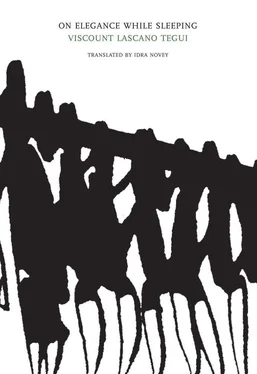SEPTEMBER 4, 18—
One more twilight. Sadness fills my soul and my thoughts are all of you. It’s seven in the evening. Right now you’re getting on the train. The other travelers are following you with their eyes. Oh, if I could only forget! Will it destroy me? No. You’re just a long shadow that’s crossed my life. I won’t see you again. I know it. The eyes that loved you have lost their quicksilver. So much effort! I’m out of hope and sorry because you remain incomplete. No other chance lover will ever have the same audacity, will ever be able to break through your crystal coffin and touch you, wake you, free you from your spell. But don’t worry. I’m like Pyrrhus after his victory. I’ve understood my defeat.
As I sink to the depths this evening, like something trapped in an aquarium, there’s nothing in all this blue but the thought of you. Your perfume wafts in and evokes the doves we heard flying over our sunrises, from our shared room in Beautiran. Do you remember how the doves that flew past our window seemed to be fanning us, flapping only one wing?
This page is inexplicable in the diary of my life. I’ve written it tenderly, as though I was once in love. It seems like sacrilege to include it as part of this intimate experiment, in which we’re testing the consolatory effects of speaking badly about others to ourselves.
SEPTEMBER 12, 18—
They called her La Española. I met her when she was already old, tall, clumsy. In the days of the Empress Eugénie, she came all the way to Bougival for an audience with La Española. A vague kinship connected them. La Española was even invited to stay in the Emperor’s home, on occasion.
She was the one who predicted my mother’s death. She spread her tarot cards across our table, in the shape of the Maltese cross. But she didn’t tell people’s fortunes for money. No; hers was a higher calling. In the south of Spain, where she was born, the locals had apparently inherited numerous ailments from their old Arab conquerors; but, in addition, they’d also inherited various means of curing them — generally by touch. While the university was still claiming that cataracts were incurable, this Señora de Salvadores triumphed as an ophthalmologist — cataracts were her specialty. (You may have heard that there are sixty or so legal classifications for blacks in the United States; in much the same way, there are many subtle distinctions separating one form of blindness from another.) Señora de Salvadores’s hands had a gift for moving gently over one’s eyes without causing the least discomfort or damage. She cured cataracts, dispersing those clouds by rubbing, by sanding them down.
The only tool she employed, aside from her fingers, was a souvenir from her days of fortune and youth: she had ground down the mother-of-pearl ribs of the decorated fans she’d used to flirt with back in the bullrings of Andalusia, and would dump this abrasive substance over the afflicted corneas, sanding down the opaque layers of cataract until she could simply remove the remnant by touch. Then she’d rub an eyelash under the affected area.
Each of Señora de Salvadores’s fingernails shone with a black patina, and during her procedures she’d wear fingerless, black lace gloves, their light-pink silk ribbons tied around her wrists.
SEPTEMBER 25, 18—
He boarded the train just as it started to depart. He sat in front of me and his initial glance enveloped me in such an atmosphere of confusion that I couldn’t free myself from it until he disembarked.
Tall, blond, reserved, he was very self-possessed. His every move seemed to slide over an invisible layer of velvet. There was no more of a sound when he moved his arms than when his eyes moved under their lashes. Was I bewitched? The more attractive he became, the more I suffered. I couldn’t escape his obvious pedigree. Over the course of our trip, his eyes seemed to get closer to mine, his lips begin to unfurl. Did he want to talk to me? This state of continual indecision went on until I felt tied to the spot and restless. I wanted to break free of the threads restraining me. I wanted to yell. But somehow, luckily, I restrained myself…I felt it wouldn’t have made the least difference to shout: my words would have turned out irrelevant, emasculated, and my voice would have come out thin and reedy like a girl’s. The man was perturbing me to the point of anguish. At last, nervous lest someone hear the feminine voice trembling in my throat, I lowered my eyes. I needed to get away from the manly power of that adorable, elegant creature. This was an unsustainable situation. At last I raised my eyes from their atonement and saw him looking at my hands, saw how, from his perspective, they must appear so soft and pink, how my lips were so red as to seem painted, how my clothes were of blue silk and my cuffs and collar made of lace. This was the inexplicable state in which I spent the rest of the trip.
His lips unfurling, wanting to speak; his eyes moving closer and closer to mine, wanting to understand me. His hands barely moved. The wind hardly ruffled his hair as it whipped through the drafty car. And when he got ready to leave, giving a last lingering look over my person, I watched him pack away the potion, the perfume, the mist that had overpowered me — snatching it up with a jealous flick of his wrist.
SEPTEMBER 26, 18—
There are intellects notable for their prodigious memory and then others simply inspired by the great chaos of the imagination. My own superiority stems from nothing so much as my own powers of observation. I’m a product of myself. I’ve seen the world through the poor little prism of my eyes. No, I never made use of borrowed eyes. And that’s why it was — through observation, a reflexive way of looking — that I always kept myself at a distance from my friends, kept aloof from my teachers. I deduced, for example, by meticulous observation, that a boy from my village was going to turn out to be a homosexual — nature simply wanted it this way. Nature hadn’t, early on, been able to make up its mind as to whether or not he should have been conceived in the first place. Then he was born a month early. The whole world fawned over him, and his father bounced him on his knee so often as to displace his proper, masculine sense of pleasure, until it came to reside deep in his rectum, silently contributing to his deviance. As a joke, I would caress the nape of his neck, stimulating without meaning to, the activity of his medulla; the girls kissed him as they would another woman and his voice stayed crystalline and his eyes infantile, melancholy, and (why?) loving. His thumbs became deformed like the thumbs of those degenerates who do nothing but abuse themselves day and night. Have you ever seen anything quite so blunt yet unreliable as the thumbs of a sodomite? Next to the rest of their dapper, delicate hands, their thumbs stand out like bastards…
They should really only have four fingers on each hand.
OCTOBER 1, 18—
Why do I like women whose faces have something of the bony facial structure of sheep?
Is it perhaps because of my distant love for a shepherd, who himself found nothing more beautiful than his animals and the constellation of Aries?
Or because one of my ancestors died on the top of an ancient wall when that wall succumbed to the continuous assault of Roman battering rams?
Because Watteau painted one of my grandmothers, who was incredibly beautiful, with a lamb in her arms?
Because the first religious icon I received was the baptism of Jesus by John the Baptist with the Agnus Dei serving as witness?
Because women with a curled upper lip have something innocent about them?
Because of all this, perhaps…and because women with long, almond eyes are irremediably sensual.
Читать дальше












